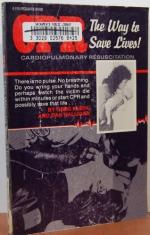|
This section contains 948 words (approx. 4 pages at 300 words per page) |

|
Cardiopulmonary resuscitation (CPR) is a procedure to support breathing and circulation on a person who has stopped breathing (respiratory arrest) and/or whose heart has stopped (cardiac arrest). It should be performed if a person is unconscious and not breathing in order to maintain oxygen and blood flow to the heart, brain, and other vital organs.
Respiratory and cardiac arrest can be caused by allergic reactions, an ineffective heartbeat, asphyxiation, breathing passages that are blocked, choking, drowning, drug reactions or overdoses, electric shock, exposure to cold, severe shock, or trauma.
CPR has been practiced for over 40 years, and is an important part of the emergency cardiac care system designed to save lives. Each year, thousands of deaths are prevented by prompt notification of the emergency medical system (EMS), followed by early CPR, defibrillation (which delivers a brief electric shock to the heart in attempt...
|
This section contains 948 words (approx. 4 pages at 300 words per page) |

|


